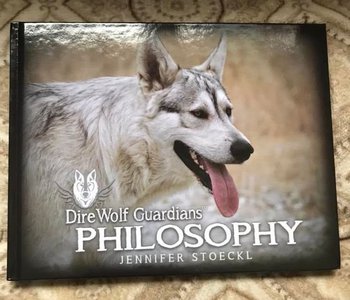Canine Culture shock
By Jennifer Stoeckl, MAT - Dire Wolf Project CEO, March 22, 2023
Yesterday, we talked about communication techniques to bridge the gap between the universal canine language and the human one.
Remember that dogs speak canine.
They must learn human as a second language.
But just like British and American English, dog breeds have accents and dialects within their broader canine language and culture.
The happy-go-lucky, outgoing Golden Retriever has a similar canine dialect as a Labrador Retriever.
The Belgian Shepherd dog’s four varieties: Belgian Malinois, Groenendael, Tervueren, and Laekenois have similar canine accents to one another.
The slow, calm, gentle Newfoundland can pair itself nicely with the more mellow Bernese Mountain dog.
Because those groupings speak with similar accents, dialects, and customs, they understand each other more easily.
But, place a calm, gentle, soft-hearted puppy in the same space as a friendly, out-going, active one and confusion and anxiety can result.
I like to think of it like this; the two puppies in the scenario above both speak canine, but their canine accents and breed-wide customs are very different from one another.
Inevitably, the one with the calm awareness is the one that backs up, puts on the breaks, or hides to get away. While the much more confident and oblivious puppy bowls over the feelings of the other, not paying any mind at all.
Americans are often described by Europeans just like that out-going, happy-go-lucky, active puppy in the above scenario.
Europeans are much more reserved and quieter in their mannerisms. They often complain that Americans are loud and obnoxious.
That doesn’t mean that certain Europeans are shy or fearful who hold to the above ideas about Americans.
They have customs that attach to their overall culture and they prefer quieter, calmer, more reserved and intimate relationships with others.
Thrust a quiet, meek, and reserved twelve-year-old Japanese girl from the small town of Shirakawa-Go into a downtown Dallas middle school without any introductory instruction on American culture and customs and she will look like a deer in the headlights. Fear and anxiety will grip her as she uses all of her mind to understand the situation in which she now finds herself. She is overwhelmed by culture shock.
When you bring your calm, quiet, sweet, loving, gentle, emotionally sensitive American Dirus puppy into your home, think of that young girl from Japan with the quivering brown eyes trying desperately to understand.
Your puppy doesn’t know the human language apart from a few words we have taught it while it lives with us. It is certainly not fluent in human. It knows there are rules, just not what they all might be.
Your puppy doesn’t understand your particular household mannerisms and customs.
Now… would you take that young Japanese exchange student and put her in cheerleading camp the first week in the United States?
Heck no!!
Instead, you would teach her. You would be gentle and respectful of the time she needs to adjust. You would help to guide her, not throw her into the inner workings of American middle school girl-drama without any support.
You would work to minimize the inevitable culture shock that might arise.
If you do not give your sensitive, mellow giant companion puppy the tools it needs to understand humans and how to live successfully in our human world, lifelong fear, anxiety, and confusion can be the result.
Here is a great piece written by Michele Welton, owner of YourPurebredPuppy.com, that explains the situation perfectly. In this article, she describes the Bernese Mountain Dog, but it applies equally to the American Dirus.
“His attitude toward strangers varies from friendly to aloof, but a good Bernese should remain poised and hold his ground. The most common temperament fault is excessive shyness, sometimes toward everyone, sometimes focused on one group of people, such as men with beards. A Bernese Mountain Dog puppy needs lots of socialization so that his natural caution does not become timidity.”
Just like the Bernese Mountain Dog and the Newfoundland, the calm, quiet, mellow, sensitive American Dirus may be confident initially, but as time goes on, the more “shy” or “fearful” your puppy appears.
If this happens, you have overwhelmed your puppy with too much culture shock.
The more anxiety and fear your puppy experiences, the more anxious and fearful your new puppy will be as an adult.
The DireWolf Guardians Philosophy book has a great section in it that spells out exactly how to socialize an American Dirus puppy in the best way.
You cannot socialize our puppies like you would socialize a more out-going, excited, oblivious type of working puppy.
Meeting and greeting a lot of people, places, and things may just turn your sweet puppy into a fearful, anxious mess as it grows.
You, your puppy, and the Dire Wolf Project DO NOT want that to happen.
As I mentioned yesterday, you want to make sure that you have all the tools to raise your giant companion puppy in the best way possible.
The only way to acquire the book that lays out the best training techniques for this particular breed is to purchase it from the Dire Wolf Project.
Right now, DireWolf Guardians Training Philosophy is for sale at a crazy low price. It won’t remain this price for long. Because it is a one-of-a-kind book for a one-of-a-kind dog breed, the price is going to increase dramatically in a short while.
All you need to do is send $38.98 to Venmo or PayPal: @direwolfdogs
Make sure you place your address in the notes section so that I can send it out to you right away.
Let’s spend more time together again tomorrow. Enjoy your day.
Jennifer Stoeckl is the co-founder of the Dire Wolf Project, founder of the DireWolf Guardians American Dirus Dog Training Program, and owner/operator of DireWolf Dogs of Vallecito. She lives in the beautiful inland northwest among the Ponderosa pine forests with her pack of American Dirus dogs.